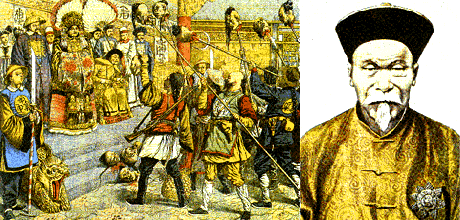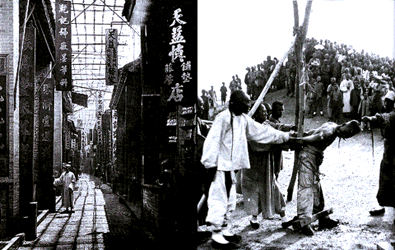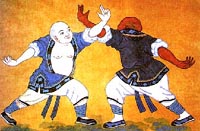China

Government: Manchu Monarchy
Ruler: Empress Tz'u Hsi (regent)
Population: 330,000,000
Politics
The start of China as a global contender begins in 1838. At the time, China was often exploited by Britian - in this case as a purchaser of opium. The Chinese government, not wanting any foriegn control, forbade the importation of the drug, and in a show of force destroyed 20,000 chests. This started the Opium War, which amounted to the British bombarding coastal cities with their warships. The result was that China was forced to sign the Treaty of Nanking. This treaty allowed Britian to dictate the terms of Chinese import trade and ceded the island of Hong Kong. Furthermore, Britons could not be tried in Chinese courts.
China became further disenfranchised with the West after the T'ai P'ing rebellion (where a Chinese Protestant led an unsuccessful revolution against the Manchus which merely resulted in mass bloodshed), and the Second Opium War (basically a repeat of the first war). This was followed by European powers carving up the Chinese countryside for themselves. Russia aquired the territory north of the Ussuri River (1860), France annexed Indo-China (supposedly avenging the murder of a missionary in 1885).
During this time, China was ruled by the Dowager Empress, Tz'u Hsi. Tz'u, while acting as regent, ruled China ruthlessly. Used to getting her way, she spent much of the country's treasury on personal effects - such as a new summer palace. When the soon-to-be Emperor (her son) neared ruling age, he died of a conveniant illness (1875), leaving yet another minor as Emperor and Tz'u as regent. Empress Tz'u Hsi did not believe that China should emulate Japan and adopt the ways of the European powers. She claimed China was a superior culture, and could therefore learn nothing from outside sources. Although this kept China at a constant disadvantage with respect to external forces, it did allow the Empress nearly free reign over her own country while providing a convenient enemy to rally China against.

Empress T'zu Hsi (left) and Li Hung-chang (right)
Diplomatic affairs were handled by vice-regent Li Hung-chang, an elder statesman. Li Hung-chang carefully kept China at peace while it was surrounded by several potent adversaries.

A street in Canton (left) and a Chinese execution (right)
Culture
Chinese culture in the 1800's was just as stratified as Europe. Men were dominant, although this distinction became less noticeable the poorer the class. Upper class women were required to be polite, not speak unless spoken to, and had to bind their feet after they were seven years old. In contrast, peasant women did the exact same work as the men.
Fashions for both sexes consisted of layers of large-sleeved tunics and trousers, more often made of silk then cotton. The sleeves of the tunics were used much like pockets are in European dress. Trousers were almost always blue in color.
Men typically wear their hair shaved in front, with a long ponytail behind. It was considered bad form to cut this pony tail. Women typically tied their hair into a bun or tuft.
Chinese Careers
Shao-Lin Monk- End 3+
The Shao-Lin Order began 1500 years ago in the Han province of China. Ancient China was a violent place, and monks had to learn to protect themselves to preserve their freedom. The Shao-Lin developed a system of combat that is based on the avoidance of conflict and the cultivation of mind, body, and spirit. The monks became famous for their Kung-Fu (literally "hard work") which gave them great prowess with their fists and staves.
Fisticuffs 2, Close Combat (polearm) 1, Stealth 1, Wilderness Travel (Mountaineering or Foraging) 1, Medicine 1, Leadership 1


Space 1889 is a registered trademark of Frank Chadwick.